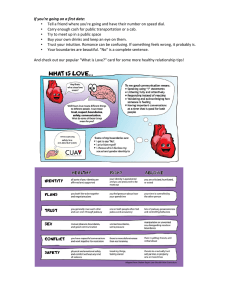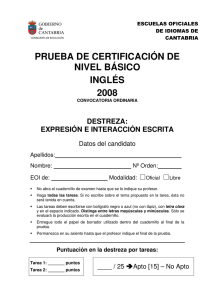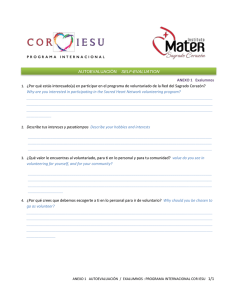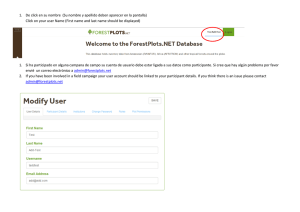family day - Smithsonian Latino Center
Anuncio
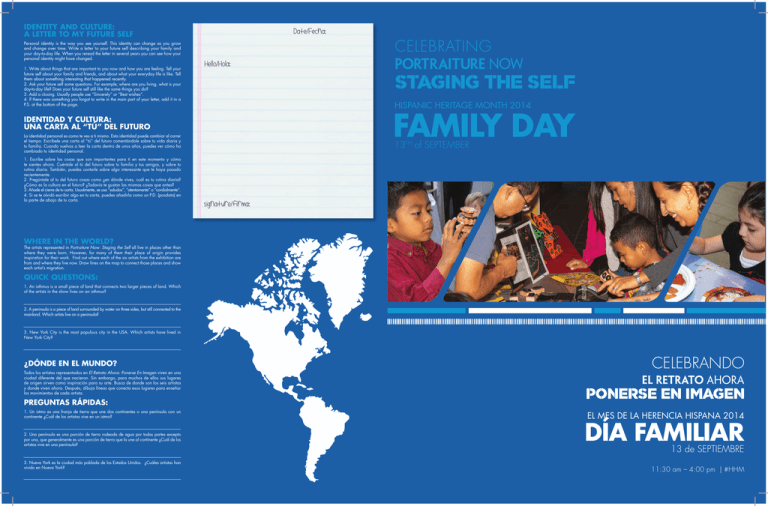
Identity and Culture: a letter to my future self Personal identity is the way you see yourself. This identity can change as you grow and change over time. Write a letter to your future self describing your family and your day-to-day life. When you reread the letter in several years you can see how your personal identity might have changed. 1. Write about things that are important to you now and how you are feeling. Tell your future self about your family and friends, and about what your everyday life is like. Tell them about something interesting that happened recently. 2. Ask your future self some questions. For example, where are you living, what is your day-to-day life? Does your future self still like the same things you do? 3. Add a closing. Usually people use “Sincerely” or “Best wishes”. 4. If there was something you forgot to write in the main part of your letter, add it in a P.S. at the bottom of the page. Date/Fecha: Celebrating Hello/Hola: HISPANIC HERITAGE MONTH 2014 FAMILY DAY Identidad y Cultura: una carta al “Tú” del futuro La identidad personal es como te ves a ti mismo. Esta identidad puede cambiar al correr el tiempo. Escríbele una carta al “tú” del futuro comentándole sobre tu vida diaria y tu familia. Cuando vuelvas a leer la carta dentro de unos años, puedes ver cómo ha cambiado tu identidad personal. 1. Escribe sobre las cosas que son importantes para ti en este momento y cómo te sientes ahora. Cuéntale al tú del futuro sobre tu familia y tus amigos, y sobre tu rutina diaria. También, puedes contarle sobre algo interesante que te haya pasado recientemente. 2. Pregúntale al tu del futuro cosas como ¿en dónde vives, cuál es tu rutina diaria? ¿Cómo es la cultura en el futuro? ¿Todavía te gustan las mismas cosas que antes? 3. Añade el cierre de tu carta. Usualmente, se usa “saludos”, “atentamente” o “cordialmente”. 4. Si se te olvidó escribir algo en tu carta, puedes añadirla como un P.D. (posdata) en la parte de abajo de tu carta. 13TH of SEPTEMBER Signature/firma: Where in the World? The artists represented in Portraiture Now: Staging the Self all live in places other than where they were born. However, for many of them their place of origin provides inspiration for their work. Find out where each of the six artists from the exhibition are from and where they live now. Draw lines on the map to connect those places and show each artist’s migration. Quick Questions: 1. An isthmus is a small piece of land that connects two larger pieces of land. Which of the artists in the show lives on an isthmus? 2. A peninsula is a piece of land surrounded by water on three sides, but still connected to the mainland. Which artists live on a peninsula? 3. New York City is the most populous city in the USA. Which artists have lived in New York City? ¿Dónde en el mundo? Todos los artistas representados en El Retrato Ahora: Ponerse En Imagen viven en una ciudad diferente del que nacieron. Sin embargo, para muchos de ellos sus lugares de origen sirven como inspiración para su arte. Busca de donde son los seis artistas y donde viven ahora. Después, dibuja líneas que conecta esos lugares para enseñar los movimientos de cada artista. Celebrando Preguntas Rápidas: 1. Un istmo es una franja de tierra que une dos continentes o una península con un continente ¿Cuál de los artistas vive en un istmo? 2. Una península es una porción de tierra rodeada de agua por todas partes excepto por una, que generalmente es una porción de tierra que la une al continente ¿Cuál de los artistas vive en una península? 3. Nueva York es la ciudad más poblada de los Estados Unidos. ¿Cuáles artistas han vivido en Nueva York? EL MES DE LA HERENCIA HISPANA 2014 DÍA FAMILIAR 13 de SEPTIEMBRE 11:30 am – 4:00 pm | #HHM Throughout the day/Todo el día 1 Art as Transformation Arte como transformación Snapshot of the Self: You can use the photo booth 2 Identity and Culture Identidad y Cultura 3 The Multicultural Puppet Project: Help our multicultural and dress up clothes to transform yourself in between puppet grow! pictures, changing your appearance just as the things that represent your culture and add it to the puppet. Immigration and Migration Inmigración y Migración Where are you from? Place a push pin on your You can decorate a paper plate with or your family’s country or countries (cities) of origin on the map. 4 Portraiture as Expression El Retrato como Expresión Portraiture Now: If you were making a portrait of someone, what techniques would you use to tell the viewer about them? Make a portrait of a friend or a family member that expresses something special about them. appearances and identities of the person or people El Proyecto del Títere Multicultural: En esta actividad ¿De dónde eres? Pon una chincheta en el mapa en tu El Retrato Ahora: Si tú haces un retrato de alguien, ¿qué técnicas usarías para comunicar como es el representado o puedes decorar un plato de papel con cosas que ciudad (o país) de origen o la de tu familia. la representada? Haz un retrato de un amigo o un pariente Auto representación: Tú puedes usar los disfraces para representan tu cultura y añadirlo al títere multicultural que expresa algo especial sobre él o ella. Today I Am Here: Try out your book-making skills transformarte entre las fotos, cambiando la apariencia y para ayudarlo a crecer. Discovering US: This was a Spanish-language by folding, writing, and illustrating a book about your workshop for local students and families. We invite you to la identidad igual como la persona o las personas en Community Art Wall: Visitors are invited to fill our family history. learn more about the project and view their photographs la serie Identidad dúplice de María Martínez-Cañas. and videos. community art wall with words and images that represent Hoy esto aquí: Crea tu propio libro, escribiendo e their communities. Descubriéndonos: Esto fue un taller para familias y ilustrando la historia de tu familia. estudiantes locales. Los invitamos a que aprendan más Arte Comunitario: Participantes están invitados a llenar sobre el proyecto y a que vean las fotografías y videos que ellos crearon durante la experiencia. el mural con imágenes y palabras que representan a in Maria Martinez-Cañas’s “Identity as Duplicity” series. sus comunidades. Wordfoto: Who are you? What words define you? Take a self-portrait with our iPads and add a few words to your image. Rendered together in Wordfoto your image and words will create a unique digital self-portrait. FotoPalabra: ¿Quién eres? ¿Qué palabra te define? Tómate un autorretrato con nuestros IPADS y añade unas palabras a tu imagen. Uniendo las palabras y la imagen creara un autorretrato digital. Please note: Visitors may be filmed, photographed, or recorded for the museum’s educational and promotional uses, including posting on Smithsonian and other public websites. Record your thoughts on your cultural identity. Look for our roving ARTLAB+ teen video production team. Busca el equipo de ArtLab+ para grabar tus pensamientos sobre tu identidad cultural. Demonstrations and Performances Demostraciones y actuaciones Smithsonian Institution Kogod Courtyard 11:30 am Community Art with Michael Vasquez Arte Comunitario con Michael Vasquez 11:30 am Grufolpawa – Traditional Panamanian Dance Danza tradicional panameña 12:00 pm Circa ‘95- New York City Hip Hop Music Hip Hop de Nueva York 12:30 pm Los Gallos Negros – Urban and rural musical traditions from Mexico and greater Latin America Música urbana y tradiciones rurales de México y Latinoamérica Hosts/Anfitrionas: National Portrait Gallery, the Smithsonian American Art Museum, the Smithsonian Center for Learning and Digital Access, and the Smithsonian Latino Center. 1:00 pm Grufolpawa – Traditional Panamanian Dance Danza tradicional panameña 1:30 pm Interactive Storytelling with Lulu Delacre Cuentos para niños con Lulu Delacre 2:00 pm Los Gallos Negros – Urban and rural musical traditions from Mexico and greater Latin America Música urbana y tradiciones rurales de México y Latinoamérica 2:30 pm Interactive Storytelling with Lulu Delacre Cuentos para niños con Lulu Delacre 3:00 pm Grufolpawa – Traditional Panamanian Dance Danza tradicional panameña 3:30 pm Circa ‘95 – New York City Hip Hop Music Hip Hop de Nueva York National Portrait Gallery Education Center 1-3 pm Record family interviews in pairs of two about your family heritage Graba entrevistas en pares sobre tu herencia familiar Collaborators/Colaboradoras: Fairfax County Family Literacy Program, Hirshhorn Museum and Sculpture Garden and the Smithsonian Heritage Month Steering Committee. Sponsors/Patrocinadores: Southwest Airlines, the Vanir Group of Companies, Inc. and in part by the Reinsch Family Education Endowment. OUR SPONSORS:
